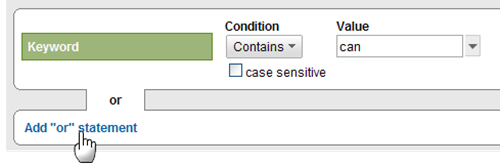To do keyword profiling to find out what your customers are really searching for, to get into their minds and understand what it is they specifically ask, you dont have to go far.
Your own site has all the answers " and heres how to find them.
The 5 Ws (+ 1 H & 1 C)
- Who
- What
- When
- Where
- Why
- How
- Can
These six words are at the heart of every conceivable question one can ask. They are the words used by searchers who want specific information; who want to see their questions answered.
You can easily find all the specific questions that led people to your site on a site-wide or page-specific level. Simply use an advanced segment that groups everyone who used one of these question words together.
Add Your Advanced Segment
You can do this manually or you can click here to add this advanced segment to your Google Analytics account.
To do it manually, click on Advanced Segments in your Google Analytics sidebar
Then click Create New Custom Segment
From the Dimensions, select Traffic Sources and drag Keywords to the drop zone.
Add one of the question words, then click Add or statement to continue adding more questions words.

Continue until your advanced segments conditions look like this:

Name your advanced segment (questions comes to mind) and save it.
Again, you can also click here to add this advanced segment to your Google Analytics account.
You can make the filter visible in as many of your profiles as you wish. Also, you can import filters from one profile to another.
Extracting The Questions
Go to the site profile you want to analyze. Lets start at the Keywords report.
Top-right click on Advanced Segments All Visits to change it.
Select your questions segment and uncheck all visits on the right so you only see the people asking questions.
Here are some of the very specific questions people used to find our blog " what did they use to find your site?
Of course you can do the same on the page level.
Start with any of your content reports, again making sure your questions advanced segment is switched on.
Find a page and click on it. In my case Im looking at the details page for 20 Things You Don't Know About Google.
Click on Entrance Keywords on the right.
![]() Here are some of the very specific questions that led people to that page:
Here are some of the very specific questions that led people to that page:
How To Use This Information
- Find the frequently asked questions and create a frequently asked questions part
- Pick a questions and answer it in a blog post
- Look at which questions led people to a specific page. Often youll see the words in the questions happen to be on the page but the page itself isnt really about the question asked. Consider writing a better page, a better post, answering that specific question.
- Look at that same info again: what can you learn about how Google apparently matched the query with your page? Ever had the same experience? How can you use that to improve your site?
- Spot your own problems: what are people trying to solve about your product or service? Can you improve there?
- Spot others problems: what are people trying to deal with regarding other peoples products or services? What can you do to turn that into business for you?
- Whats obvious to you but seems to be puzzling to others?
How are you going to use this information?


![SNAGHTMLa07e180[4] SNAGHTMLa07e180[4]](https://www.searchenginepeople.com/wp-content/uploads/2010/09/SNAGHTMLa07e1804_thumb.png)



